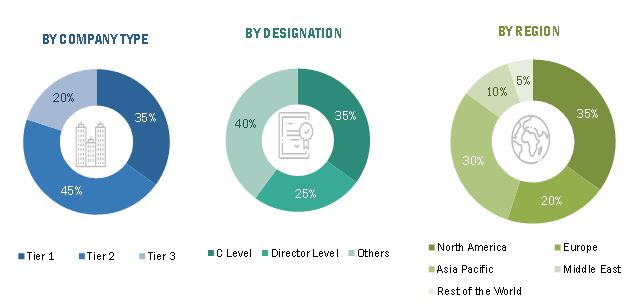Anti-Tank Weapon Market by Type (Man-Portable and Vehicle-Mounted), Platform (Airborne and Ground-Based), End User (Homeland and Military), and Region - Global Forecast to 2030
Exhaustive secondary research was done to collect information on Anti-Tank Weapon market, its adjacent markets, and its parent market. The next step was to validate these findings, assumptions, and sizing with industry experts across the value chain through primary research. Demand-side analyses were carried out to estimate the overall size of the market. Both top-down and bottom-up approaches were employed to estimate the complete market size. Thereafter, market breakdown and data triangulation were used to estimate the size of segments and subsegments.
Secondary Research
In the secondary research process, various secondary sources, such as D&B Hoovers, Bloomberg, Business Week, and different magazines were referred to identify and collect information for this study. Secondary sources also included annual reports, press releases & investor presentations of companies, certified publications, articles by recognized authors, and research papers.
Primary Research
Extensive primary research was conducted after acquiring information regarding the Anti-Tank Weapon market scenario through secondary research. The market for Anti-Tank Weapon is being driven by a range of stakeholders, including Anti-Tank Weapon manufacturers, infrastructure providers, and governments. The demand-side of this market is characterized by various end users, such as component manufacturers as well as facility providers and service providers. The supply side is characterized by technological advancements and the development in Anti-Tank Weapons. Various primary sources from both the supply and demand sides of the market were interviewed to obtain qualitative and quantitative information. Following is the breakdown of primary respondents.

To know about the assumptions considered for the study, download the pdf brochure
Market Size Estimation
Both the top-down and bottom-up approaches were used to estimate and validate the total size of the Anti-Tank Weapon market. These methods were also used extensively to estimate the size of various subsegments in the market. The research methodology used to estimate the market size includes the following:
- The key players in the industry and markets were identified through extensive secondary research.
- The industry’s supply chain and market size, in terms of value, were determined through primary and secondary research processes.
- All percentage shares, splits, and breakdowns were determined using secondary sources and verified through primary sources.
Data Triangulation
After arriving at the overall market size from the market size estimation process, the total market has been split into several segments and subsegments. To complete the overall market engineering process and arrive at the exact statistics for market segments and subsegments, the data triangulation procedure has been implemented, wherever applicable. The data has been triangulated by studying various factors and trends from both the demand and supply sides. Along with this, the market size has been validated using both top-down and bottom-up approaches.
Report Objectives
- To define, describe, segment, and forecast the size of the Anti-Tank Weapon market based on type, end-user, platform, and region.
- To forecast the size of different segments of the market with respect to five key regions, namely, North America, Europe, Asia Pacific, Middle East, and Rest of the World, along with their key countries
- To identify and analyze the key drivers, restraints, opportunities, and challenges influencing the growth of the market.
- To identify technology trends currently prevailing in the Anti-Tank Weapon market
- To analyze micro markets with respect to individual growth trends, prospects, and their contribution to the overall market
- To analyze opportunities in the market for stakeholders by identifying the key market trends
- To profile the leading market players and comprehensively analyze their market share and core competencies.
- To analyze the degree of competition in the market by identifying the key growth strategies, such as acquisitions, new product launches, contracts, and partnerships, adopted by the leading market players.
- To identify detailed financial positions, key products, and unique selling points of the leading companies in the market
- To provide a detailed competitive landscape of the market, along with a ranking analysis, market share analysis, and revenue analysis of the key players
Scope of the Report
|
Report Metric |
Details |
|
Market size available for years |
2023–2028 |
|
Base year considered |
2022 |
|
Forecast period |
2023-2028 |
|
Forecast units |
Value (USD Million) |
|
Segments covered |
By Type, By End-User, By Platform |
|
Geographies covered |
North America, Europe, Asia Pacific, Middle East, Rest of the World |
|
Companies covered |
Rafael Advanced Defense Systems (Israel), MBDA (France), Raytheon Company (US), KBP Instrument Design Bureau (Russia), Saab AB (Sweden), Elbit Systems Ltd (Israel), Denel Dynamics (South Africa), General Dynamics Corporation (US), Lockheed Martin Corporation (US), ROKETSAN AS (Turkey) are some of the major players of Anti-Tank Weapon Market. (25 Companies) |
Anti-Tank Weapon Market Highlights
The study categorizes the Anti-Tank Weapon market based on Type, End-User, Platform, and Region.
|
Segment |
Subsegment |
|
By Type |
|
|
By End-User |
|
|
By Platform |
|
|
By Region |
|
Available Customizations
MarketsandMarkets offers the following customizations for this market report:
Company Information
- Profiling of additional market players (up to 5)
Product Analysis
- Product matrix, which provides a detailed comparison of the product portfolio of each company in the Anti-Tank Weapon Market.
















Growth opportunities and latent adjacency in Anti-Tank Weapon Market